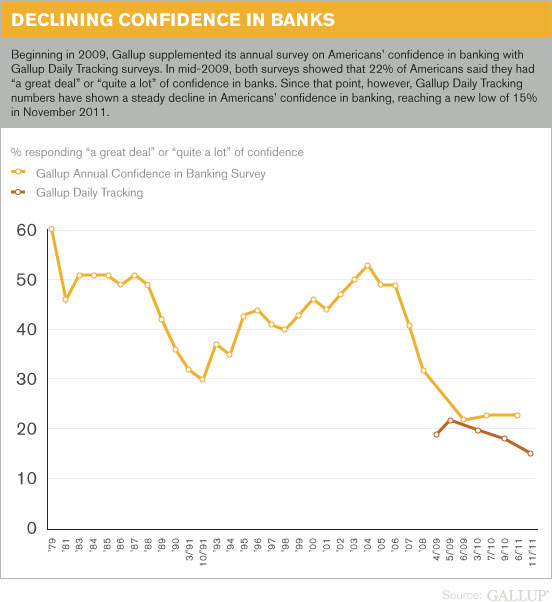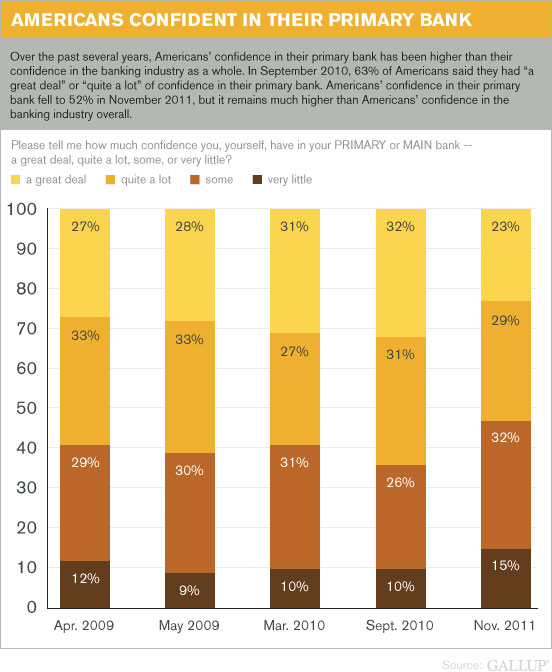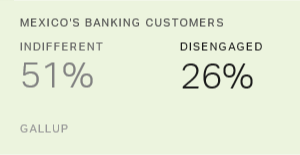The financial crisis in Europe appears to have spilled over into Americans' perceptions of U.S. banks. Whether and how the problems in Europe will be fixed seems to change daily. Still, some on Wall Street have voiced fears that the European banking crisis might be similar to what the U.S. experienced in 2008 and 2009 -- and that's reason enough to be concerned about the global financial system.
The drop in Americans' confidence in their primary bank is more disturbing than the decline in their perceptions of the industry.
In the U.S., the Occupy Wall Street movement's goals and future remain uncertain. But the heightened anti-Wall Street and anti-bank feelings that inspired the movement haven't gone away.
For example, when the Federal Reserve announced a reduction in the fees that banks could charge retailers for processing debit card payments, several major banks -- including Bank of America -- notified customers that they would begin charging a monthly fee for using debit cards, in part to recoup the lost revenue. The resulting consumer backlash caused the banks to abandon their plans as consumers threatened to move their accounts to smaller institutions and credit unions and as Washington threatened an investigation into the debit card fees.
In this interview, Gallup Chief Economist Dennis Jacobe, Ph.D., reflects on Americans' declining confidence in U.S. banks. He suggests that today's bankers need to "think behavioral economics" -- the study of the role emotions play in the marketplace -- if they want to avoid making an extremely challenging situation even worse.
GMJ: In the wake of the financial crisis and the Occupy Wall Street protest movement, what do Americans think of banks?
Dennis Jacobe, Ph.D.: The results of our November 29-30 Gallup Daily Tracking poll concerning confidence in banking are stunning -- and not in a good way. The percentage of Americans who had "a great deal" or "quite a lot" of confidence in the U.S. banking system fell to a record low of 15%. This continues the decline from 22% recorded in mid-2009 during the financial crisis. At the same time, the percentage of Americans who had "very little" or no confidence in the U.S. banking system reached a record high of 42%.
In comparison, in 2007 -- prior to the recession and financial crisis -- 41% had "a great deal" or "quite a lot" of confidence in banks while only 14% professed "very little" or no confidence. This is almost the complete reverse of where the banking business finds itself today.
 GMJ: If Americans' confidence in U.S. banks is so low, why are banks able to grow their deposits while paying almost nothing in interest?
GMJ: If Americans' confidence in U.S. banks is so low, why are banks able to grow their deposits while paying almost nothing in interest?
Dr. Jacobe: Federal deposit insurance plays an important role. But customers' confidence in their primary bank -- as opposed to their confidence in the banking industry as a whole -- has remained comparatively high. For example, when we polled Americans a year ago, 63% said they had "a great deal" or "quite a lot" of confidence in their primary bank. Though Americans' confidence in their primary bank fell to 52% in our November 29-30 poll -- lower than in April 2009 -- it remains much higher than Americans' confidence in the banking industry overall.

GMJ: Why would consumers be confident in their own bank but lack confidence in the industry overall?
Dr. Jacobe: This isn't as strange as it may seem. In another recent Gallup poll, we found that though 76% of Americans say Congress does not deserve to be re-elected, more than half support the re-election of their member of Congress. This "proximity effect" can happen when an overall industry has a damaged public perception that differs from the actual experience Americans have with individual members of that industry or organization.
On the other hand, the drop in Americans' confidence in their primary bank is more disturbing than the decline in their overall perceptions of the banking industry, particularly because it seems to have resulted in a general decline in customers' loyalty to their primary bank. Americans' loyalty to their primary bank fell to 23% in November 2011 from 32% in September 2010. This means that many banking customers are more likely than ever before to be open to switching their primary bank.
The key driver of lower bank loyalty appears to be a sharp decline in the number of bank customers who are extremely satisfied with their primary bank's products and services. This rating dropped 11 percentage points, from 39% in December 2010 to 28% in November 2011. This is one of the reasons I think it is more important than ever that bankers begin to "think behavioral economics" in the years ahead.
-- Interviewed by Jennifer Robison
In part two of this conversation, Dr. Jacobe will reflect on what bankers can learn from the backlash against proposed changes in debit card fees. He will discuss how they can apply the principles of behavioral economics -- the study of the role emotions play in the marketplace -- to build customer engagement and loyalty in a hostile banking environment.
